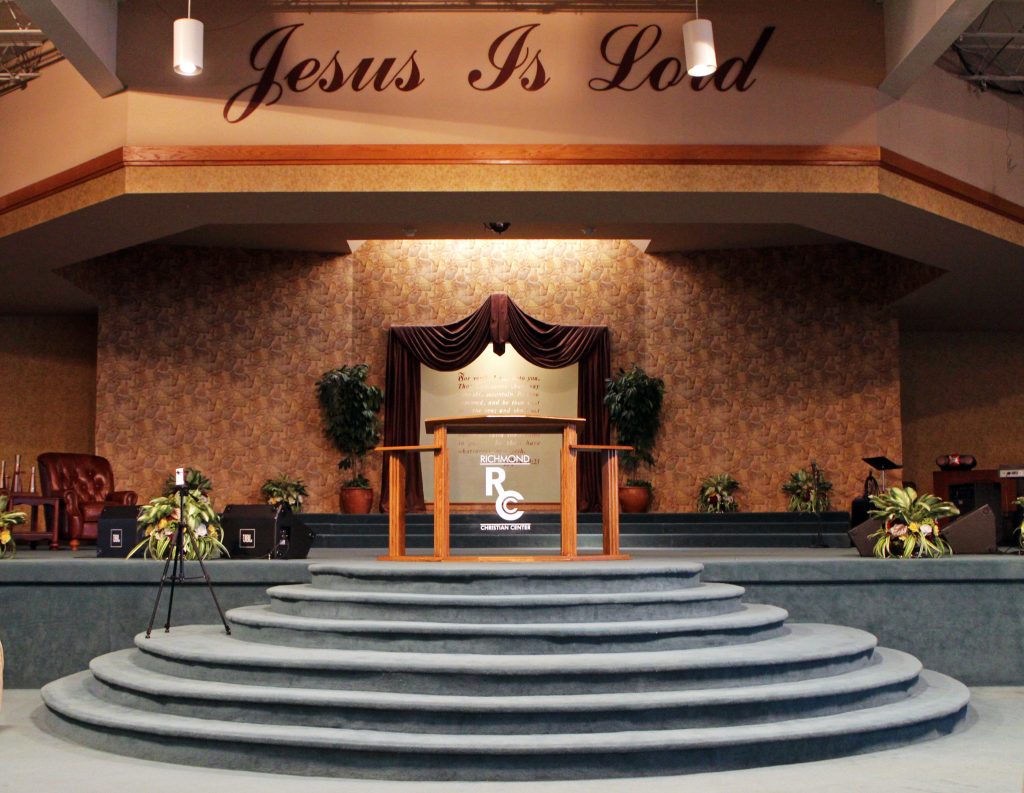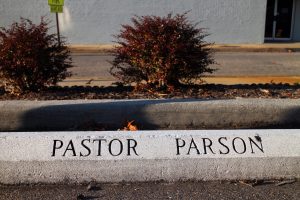The Southside church’s Chapter 11 bankruptcy reorganization plan was cleared for confirmation in federal court on Thursday, paving the path for the institution to fully emerge from bankruptcy after nearly three years of uncertainty.
Dozens of RCC parishioners filled the courthouse pews to hear Judge Keith Phillips say that he’ll enter an order confirming the plan, after which the 300-member church will be free of the veil of bankruptcy and all of its creditors will receive 100 percent of what they’re owed.
Upon the judge’s ruling, hugs and hand shaking began, and a few audible hallelujahs could be heard, albeit in subdued courtroom tones.
“This is a very happy day for them,” said LeClairRyan attorney Chris Perkins, who worked the case on behalf of bankruptcy trustee Bruce Matson. “It’s been a very long journey for this church.”
They celebrated the end of a process that began in 2013 and led to two bankruptcy filings, two attempts at foreclosure on their church, legal battles involving their once beloved pastor and numerous delays of the final confirmation.

RCC nearly lost its Southside church to foreclosure, and at one point actually had another church buyer lined up after an auction.
Matson, the trustee, who typically works big corporate bankruptcies such as that of LandAmerica, said the case for him was uniquely rewarding and interesting.
“An awful lot of my career has been representing institutions and often times entities without a face. This one was a very human case,” he said. “It wasn’t a big-dollar case; it wasn’t a big-dollar case for fees earned. But it was a big challenge, and how often to you get to help 300 people save an institution like a church?”
The church, however, still has more work to do. As part of its reorganization, RCC must adhere to a five-year business plan that includes paying its bills on time, paying back creditors and bankruptcy administration fees, and increasing its tithes and other forms of revenue.
And – at least in the interim – the reorganization plan calls for keeping RCC’s founding pastor Stephen A. Parson Sr. away from any involvement in the church. Parsonhas been on a forced sabbatical from the church since January and any interference on his part will be considered a default on the loan agreement. That stipulation was a sticking point for Foundation Capital Resources, the lender whose foreclosure efforts in 2013 pushed the church into Chapter 11.
According to the agreed upon terms, as long as FCR remains the holder of the loan to RCC, Parson cannot be involved in the church. That tension between Parson and the lender is due in part to the discovery that hundreds of thousands of dollars of the church’s money was used by Parson and his family members for personal use while RCC was headed toward foreclosure and bankruptcy.
Parson at times continued to be an impediment to the Chapter 11 process, including allegedly attempting to steer bankruptcy estate money his way and bringing the church unwanted publicity through his public endorsements of Donald Trump’s presidential campaign.Not one to go out quietly, Parson waited until the last minute of Thursday’s hearing to address the court. His brief statement before the judge made clear that he still believes the church is his to lead: He introduced himself as the pastor of RCC and spoke of the parishioners as “my congregation.”
One of the challenges of the case, Matson said, was carefully navigating the dynamic between the pastor, the congregation and the influence Parson held over the organization.
“It was a very difficult dynamic, because in many respects, I removed the pastor. It’s a very tough and dramatic thing to do,” he said. “There’s no question in my mind we wouldn’t have been able to accomplish what we did if the pastor was in control.”
Kevin Funk, an attorney with DurretteCrump who represented RCC throughout the bankruptcy, said he was happy to see the church make it out of Chapter 11.
“I’m extremely pleased the debtor is exiting bankruptcy with its church intact,” he said.
Paul Campsen, a Kaufman & Canoles attorney representing the church’s lender, also echoed the sentiment.
“We were pleased that the plan was confirmed, that all the disputes were resolved and that the congregation will continue to enjoy their home,” he said.
Perkins said the resolution of the case is a testament to the bankruptcy process.
“This was sort of exactly what bankruptcy is all about,” Perkins said. “A collective problem in which all constituents have to bend a little and give a little … And at the end of the day we all win. The creditors will do much better under this plan, and the church will survive.
The congregants of Richmond Christian Center finally got their chance to celebrate.
The Southside church’s Chapter 11 bankruptcy reorganization plan was cleared for confirmation in federal court on Thursday, paving the path for the institution to fully emerge from bankruptcy after nearly three years of uncertainty.
Dozens of RCC parishioners filled the courthouse pews to hear Judge Keith Phillips say that he’ll enter an order confirming the plan, after which the 300-member church will be free of the veil of bankruptcy and all of its creditors will receive 100 percent of what they’re owed.
Upon the judge’s ruling, hugs and hand shaking began, and a few audible hallelujahs could be heard, albeit in subdued courtroom tones.
“This is a very happy day for them,” said LeClairRyan attorney Chris Perkins, who worked the case on behalf of bankruptcy trustee Bruce Matson. “It’s been a very long journey for this church.”
They celebrated the end of a process that began in 2013 and led to two bankruptcy filings, two attempts at foreclosure on their church, legal battles involving their once beloved pastor and numerous delays of the final confirmation.

RCC nearly lost its Southside church to foreclosure, and at one point actually had another church buyer lined up after an auction.
Matson, the trustee, who typically works big corporate bankruptcies such as that of LandAmerica, said the case for him was uniquely rewarding and interesting.
“An awful lot of my career has been representing institutions and often times entities without a face. This one was a very human case,” he said. “It wasn’t a big-dollar case; it wasn’t a big-dollar case for fees earned. But it was a big challenge, and how often to you get to help 300 people save an institution like a church?”
The church, however, still has more work to do. As part of its reorganization, RCC must adhere to a five-year business plan that includes paying its bills on time, paying back creditors and bankruptcy administration fees, and increasing its tithes and other forms of revenue.
And – at least in the interim – the reorganization plan calls for keeping RCC’s founding pastor Stephen A. Parson Sr. away from any involvement in the church. Parsonhas been on a forced sabbatical from the church since January and any interference on his part will be considered a default on the loan agreement. That stipulation was a sticking point for Foundation Capital Resources, the lender whose foreclosure efforts in 2013 pushed the church into Chapter 11.
According to the agreed upon terms, as long as FCR remains the holder of the loan to RCC, Parson cannot be involved in the church. That tension between Parson and the lender is due in part to the discovery that hundreds of thousands of dollars of the church’s money was used by Parson and his family members for personal use while RCC was headed toward foreclosure and bankruptcy.
Parson at times continued to be an impediment to the Chapter 11 process, including allegedly attempting to steer bankruptcy estate money his way and bringing the church unwanted publicity through his public endorsements of Donald Trump’s presidential campaign.Not one to go out quietly, Parson waited until the last minute of Thursday’s hearing to address the court. His brief statement before the judge made clear that he still believes the church is his to lead: He introduced himself as the pastor of RCC and spoke of the parishioners as “my congregation.”
One of the challenges of the case, Matson said, was carefully navigating the dynamic between the pastor, the congregation and the influence Parson held over the organization.
“It was a very difficult dynamic, because in many respects, I removed the pastor. It’s a very tough and dramatic thing to do,” he said. “There’s no question in my mind we wouldn’t have been able to accomplish what we did if the pastor was in control.”
Kevin Funk, an attorney with DurretteCrump who represented RCC throughout the bankruptcy, said he was happy to see the church make it out of Chapter 11.
“I’m extremely pleased the debtor is exiting bankruptcy with its church intact,” he said.
Paul Campsen, a Kaufman & Canoles attorney representing the church’s lender, also echoed the sentiment.
“We were pleased that the plan was confirmed, that all the disputes were resolved and that the congregation will continue to enjoy their home,” he said.
Perkins said the resolution of the case is a testament to the bankruptcy process.
“This was sort of exactly what bankruptcy is all about,” Perkins said. “A collective problem in which all constituents have to bend a little and give a little … And at the end of the day we all win. The creditors will do much better under this plan, and the church will survive.




